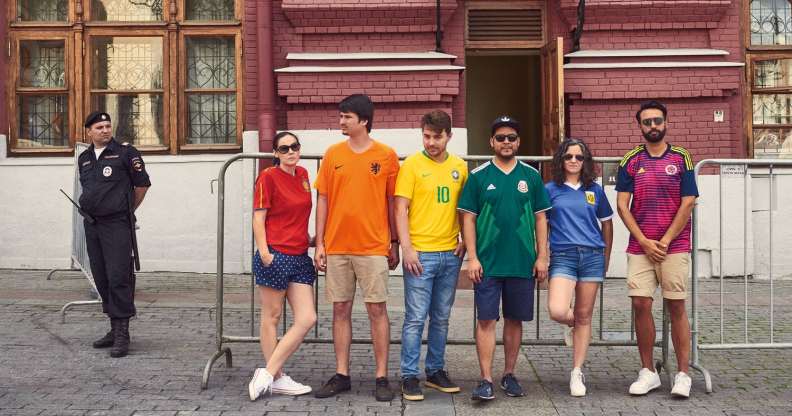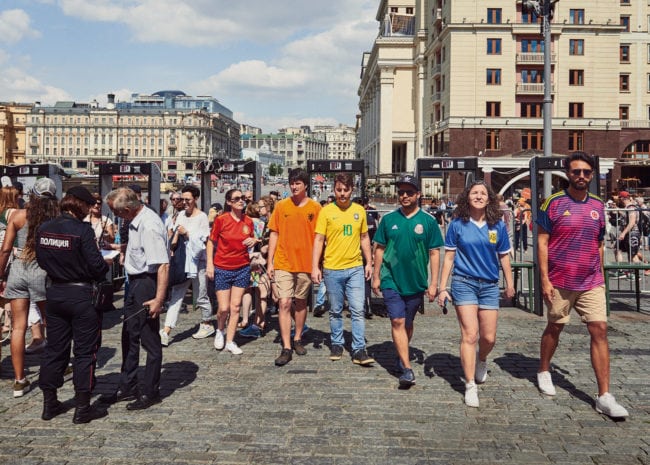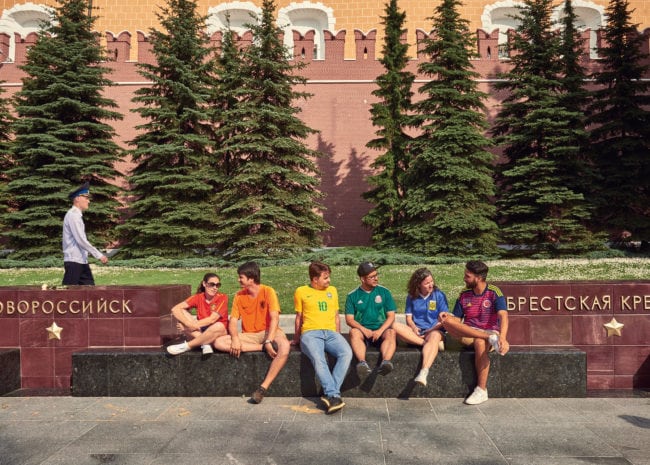LGBT activists use Russia World Cup to hide rainbow flag in plain sight

The six activists pose with their respective national team’s football jerseys to form the rainbow flag (Image by The Hidden Flag/TheHiddenFlag.org)
Updated | Taken individually, they are just like any other World Cup supporter wearing their national team’s jersey. But all together, they make up a powerful symbol in support of LGBT+ people in a country where such images are banned under a controversial 2013 law.
Six activists from Spain, the Netherlands, Brazil, Mexico, Argentina and Colombia traveled to Russia to hide the LGBT rainbow flag in plain sight, using their national team’s colours to form the iconic banner of pride and inclusion—right in front of seemingly unsuspecting police officers.
The initiative, aptly named “The Hidden Flag,” was launched by Spain’s State Federation of Lesbians, Gays, Transexuals and Bisexuals (FELGTB) to protest the so-called gay propaganda ban enacted five years ago to international condemnation, as the legislation criminalises the demonstration, promotion and distribution of pro-LGBT material.

The initiative was launched by Spain’s State Federation of Lesbians, Gays, Transexuals and Bisexuals (Photo by The Hidden Flag/thehiddenflag.org)
“Being visible is always a risk, but doing it in front of thousands of World Cup fans, is what motivated us to carry out the protest,” FELGTB president Uge Sangil said in a statement about the initiative published on Friday titled “Love 1-Russia 0.”
As with the Sochi Winter Olympics in 2014, an international sporting event the magnitude of the World Cup has placed Russia under intense scrutiny for its human rights record on LGBT+ issues—particularly in light of the situation in Chechnya, where, according to reports in the Russian press and by Russian non-governmental organisations, authorities carried out a purge of gay and bisexual men last year. Ahead of the tournament, the Football Supporters’ Federation issued a guide to LGBT+ football fans wishing to attend the games—referenced by the Foreign Office in its official guidelines—advising “do not publicly display your sexuality.”
The participants were selected via an open call for application the FELGTB shared among its network. “We wanted people who were involved in their communities, people who are activists and fearless. It was also key that each country was represented by someone really from that country,” a spokesperson for LOLA MullenLowe, a Spain-based advertising agency that was among the organisations supporting FELGTB’s initiative, told PinkNews.
The six activists returned home after spending five days in the country. “We agreed from the beginning that we wouldn’t promote the initiative until they were safely back in their home countries, just in case,” the spokesperson said.

The six activists took pictures in front of Russian landmarks and seemingly unsuspecting police officers (Photo by The Hidden Flag/thehiddenflag.org)
In personal statements published on the Hidden Flag website, the six activists taking part in the FELGTB initiative expressed a certain apprehension in taking part in the protest. “They called me and I didn´t even think twice about it. I almost fainted, although I won’t lie I was a little scared,” said Marta Márquez, a writer and president of the GALEHI Association of LGBT+ Families, whose Spanish football jersey represented the red in the flag.
Eloi Pierozan Junior, a marketing manager who wore Brazil’s yellow jersey, said that his boyfriend was concerned about the risks involved in the project. “’Are you crazy?’ My boyfriend asked me. ‘It’s really dangerous’. ‘I’m not worried about the risk, it’s a project that I really want to be involved in’ I told him. And truthfully, it has been the most emotional project I have ever been taken part in,” he said.
Dutch estate agent Eric Houter describes himself as a heterosexual man, but he agreed to take part in the protest after his brother had to drop out. “What convinced me was brotherly love, as I’ve never been an activist. But then, when I understood the danger and the pressure of being out there, that reaffirmed by decision. I wanted to support. We need to see heterosexuals also fighting for this,” he said.
This article was updated to include comments from a FELGTB spokesperson received after publication.

